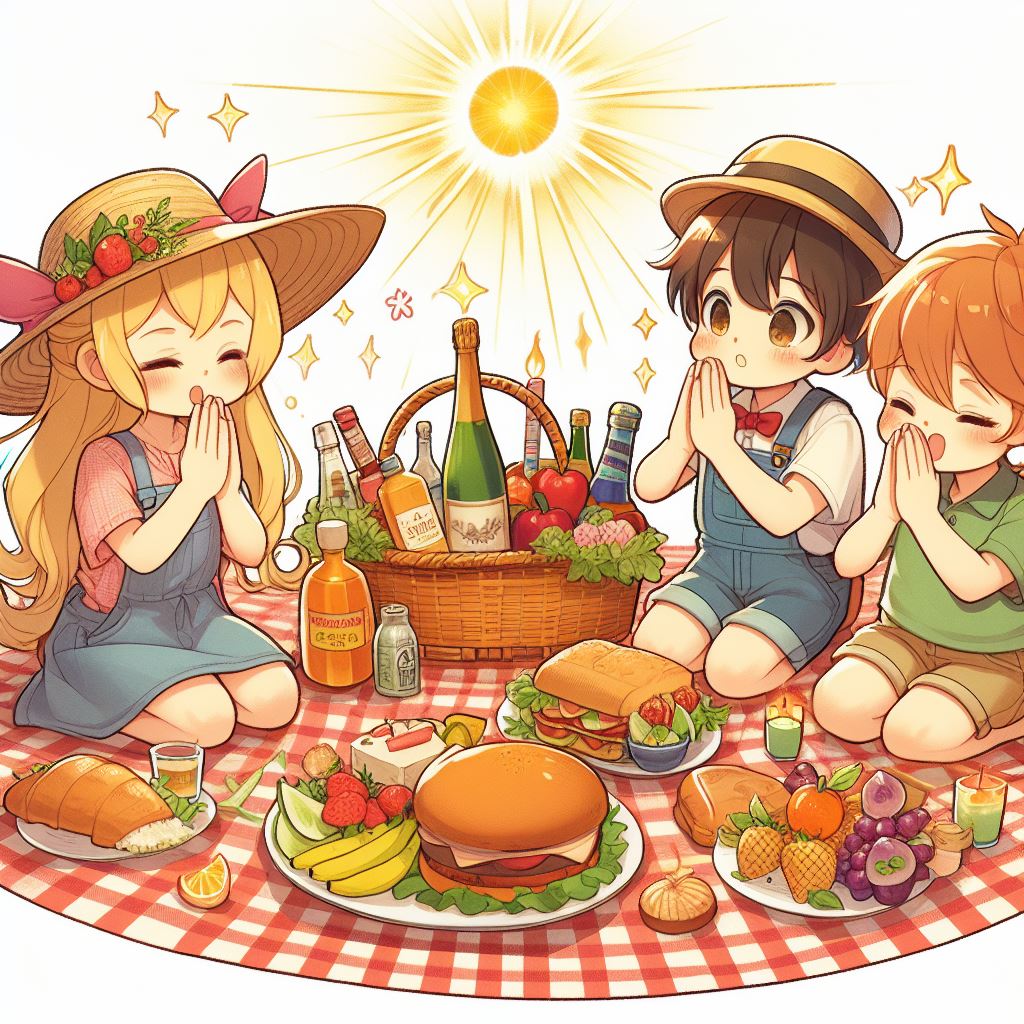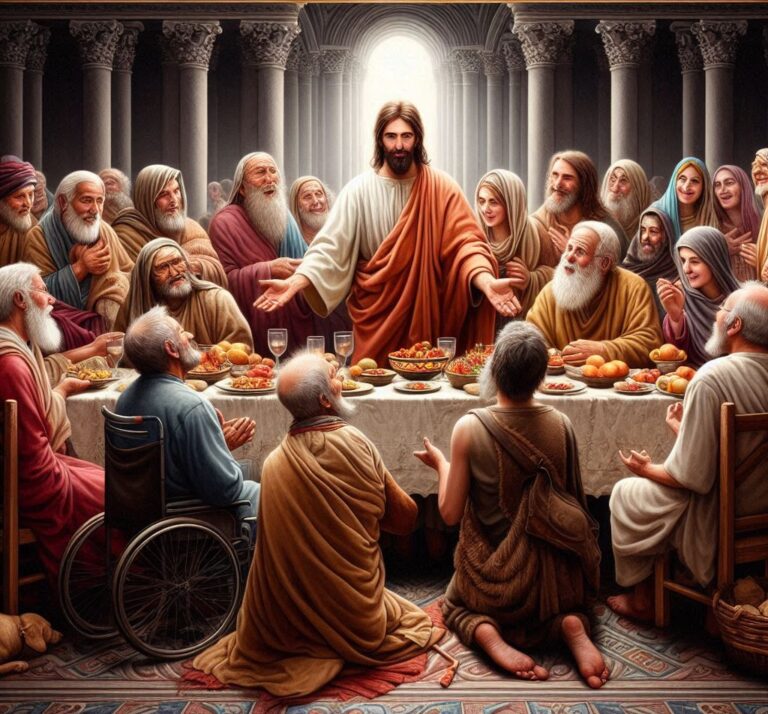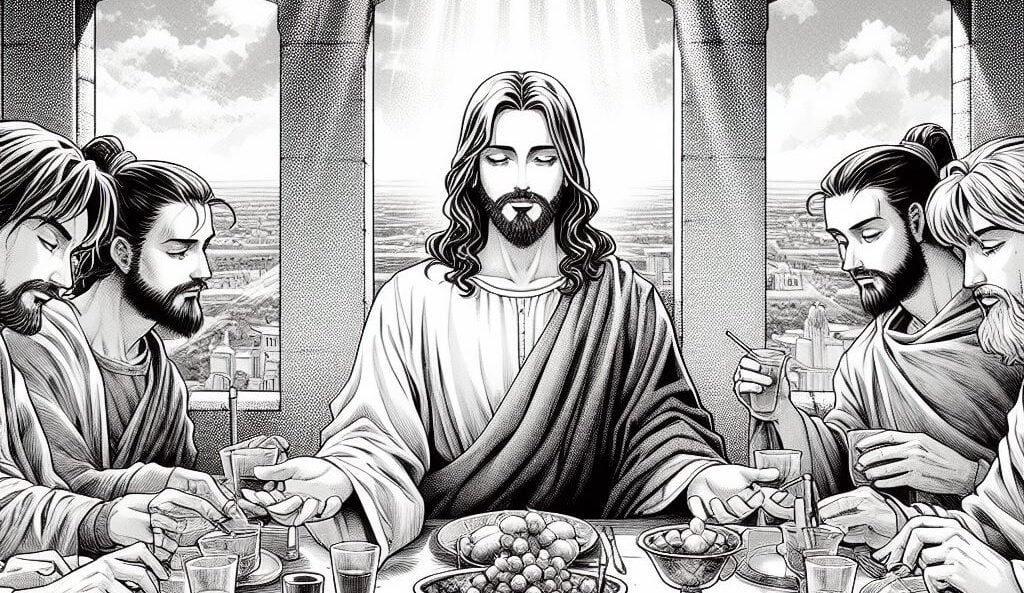How to bless food and the table in a catholic way
In this article, we are going to see the origin, meaning and benefits of saying grace before meals, as well as some short examples of how to say grace before meals. Now we are going to explain how to say the grace before meals or dinner. There are many ways to say grace, depending on tradition, culture or each person’s preference. The important thing is to do it with faith, with gratitude and with love. The blessing of food is done before starting to eat, when all the diners are sitting around the table and in silence. Here we offer you some saying grace examples to bless food, always at the end of the prayer we say “Amen”.
Say Grace Examples
- God is great, and God is good, let us thank Him for our food. By His blessings we are fed, give us Lord, our daily bread.
- Thank you for the world so sweet, thank you for the food we eat. Thank you for the birds that sing, thank you, God for everything.
- For food in a world where many walk in hunger, for faith in a world where many walk in fear, for friends in a world where many walk alone. We give you thanks, O Lord.
- Lord, thank You for the food before us, the family and friends beside us and the love between us.
- Heavenly Father, we thank you for this food, for those who prepared it, and for the family and friends with whom we share it.

- Bless this food we are about to share, a sign of your goodness to us, bless those who prepared it, and who serve it, and keep us ever mindful of those who go hungry this night.
- Lord, bless the food that we are going to receive because of your goodness. Give us health to earn them, peace to enjoy them and love to share them.
- Bless this food to our bodies, Lord, and let us hold you in our hearts. In Jesus name we pray.
- God, we thank you for this food. For rest and home and all things good. For wind and rain and sun above. But most of all for those we love.
- Lord, bless these foods that we receive from your generosity. Give bread to those who are hungry and hunger for God to those who have bread.
- Thank you good God for this day that ends. Thank you for the work, for the study, for the rest. Thank you for this family, for these friends, for these brothers.
- Bless us O Lord, and these Thy gifts, which we are about to receive, from Thy bounty. Through Christ, our Lord. Video
How to say grace for Thanksgiving
Saying grace for Thanksgiving involves expressing gratitude for the meal, the company, and the blessings received throughout the year. A simple and heartfelt grace might include acknowledging the source of the food, the efforts of those who prepared it, and the joy of sharing the occasion with loved ones. Whether it’s a traditional prayer or a personal expression of thanks, the essence of saying grace is to give thanks with a grateful heart. Next there is an example of how to say thanksgiving grace:
O Lord, with humble hearts we pray
thy blessing this Thanksgiving Day
and ask that at table place,
where grateful folk say words of grace,
that Thou will come to share the yield
thy bounty gave to farm and field.
We pray thy love will bless, O Lord,
each hearth, each home, each festive board;
and that Thy peace will come to stay
where candles glow, Thanksgiving Day.
Children’s prayer to say grace

Parents have the responsibility of educating their children in the faith and Christian values. By teaching them to bless food, they transmit an attitude of gratitude and love towards God and their neighbor.
Thus, they prepare them to live a full and happy life, in communion with God and with their brothers. Children like to say a prayer to bless the table in a funny way. Below we leave you a prayer that will please God and the little ones in the house:
Good food,
good meat,
thanks God,
let’s eat.
Song to bless the table
“Who sings, prays twice” is a phrase attributed to Saint Augustine. Each family chooses how to say grace before eating and some prefer to bless the table by singing. Following the rhythm of the song “Turkey In The Straw” then sing:
We thank the Lord for a thousand things,
for the flowers that bloom and the birds that sing,
for the sun that shines and the rain that drops,
for ice cream and raisins and lollipops.
Say grace meaning
We must clarify that the expression “saying grace” is used more frequently, however the phrase “bless the food” and “bless the table” are often used too. But the three expressions refer to the same fact, which is to say grace to God before eating. In this article we will use the three expressions interchangeably.
Saying grace is a tradition rooted in many cultures. It consists of saying a prayer or a formula of gratitude before starting to eat, recognizing the divine origin of the food and asking God for his blessing.
“Christians, whether alone or with companions at table, say grace before and after meals to thank God for his goodness in providing their daily food. This practice is also a reminder that the Lord Jesus combined the sacrament of the eucharist with the ritual of a family meal and showed himself to his disciples as their risen Lord in the breaking of the bread” – Book of Blessings by National Conference of Catholic Bishops 813
The origin of saying grace prayer

The custom of blessing the food dates back to very ancient times, when human beings depended directly on nature for their sustenance.
The first farmers and ranchers offered sacrifices and offerings to the deities they believed controlled the climate, fertility and abundance. In this way, they expressed their gratitude for the crops and flocks, and asked for their protection and favor for the future.
As time went by, this practice transformed into a simpler and more symbolic way of giving thanks for food, without the need to shed blood or burn animals. Thus, in the ancient civilizations of Mesopotamia, Egypt, Greece and Rome, it was customary to pronounce a brief invocation or make a gesture of reverence before eating, dedicating a part of the food to their gods or the spirits of their ancestors.
Saying Grace in the Bible

For the people of Israel, the blessing of the table has its origins in the exodus from Egypt, when God provided them with manna in the desert. The Israelites had to collect enough to eat each day, saving nothing for the next day, trusting that God would provide for them each morning. Before and after eating the manna, they were to bless God for his goodness and faithfulness. This custom continued after entering the promised land, where:
“God rained manna upon them for food; grain from heaven he gave them” – Psalm 78:24
In the Bible, blessing food before eating is based on the example of Jesus Christ, who always gave thanks to the Father with a Christian prayer to bless food before breaking bread and sharing it with his disciples. The Maundy Thursday on the Last Supper, which instituted the Eucharist, was precisely a blessing of the table, in which Jesus consecrated the bread and wine as his body and blood, given for the salvation of the world. Us Christians follow this tradition, celebrating the Eucharist in which the bread is broken, turning it into the Body of Christ, and giving thanks to God for everything we receive each day.
“As they gather at table and see in the food they share a sign of God’s blessings on them, Christians should mindful of the poor, who lack even the bare minimum of food that those at table may have in abundance. By their moderation they will therefore try to provide help for the hungry and as a sign of Christ’s love will on occasion invite the poor to their own table, in keeping with the words of Christ recorded in the Gospel” – Book of Blessings by National Conference of Catholic Bishops 814

“Rather, when you hold a banquet, invite the poor, the crippled, the lame, the blind; blessed indeed will you be because of their inability to repay you. For you will be repaid at the resurrection of the righteous” – Luke 14 13:14
The meaning of say grace prayer
Blessing the table has a deep spiritual and human meaning. In doing so, we recognize that everything we have is a gift from God, who loves us and cares for us like a father.
“Give us today our daily bread” – Matthew 6:11
We also express our gratitude for his generosity and providence. Additionally, we ask for your blessing on the foods we are going to consume, so that they nourish us and strengthen us physically and spiritually.
Blessing the table also implies a community and social dimension. By sharing bread with our family or friends, we manifest our communion and our brotherhood with them.
We also remember those who have nothing to eat, and we commit to being supportive and generous with those most in need. Thus, blessing the table is a way of living Christian charity, which calls us to love God above all things and our neighbor as ourselves.

The benefits of the prayer of blessing food
Blessing the food, in addition to being an act of faith and love, also helps transmit values such as faith, humility, generosity and respect.
- Faith is strengthened by trusting God as the giver of all good and asking Him to bless what we are going to eat.
- Humility is manifested by recognizing that we are not self-sufficient and that we depend on God for our sustenance.
- Generosity is cultivated by sharing what we have with others, especially those most in need.
- Respect is shown by taking care of the quality and quantity of what we eat, avoiding waste and excessive consumption.
Other benefits that prayer brings us to bless food and the table are:
- It unites us and brings us closer to the people with whom we share the table, promoting dialogue and coexistence.
- Prayer fills us with joy and hope, praising God for his wonders and trusting in his promise.

Is it a sin not to say grace?
It is not a sin not to bless the food. However, blessing food is a good custom to keep God in mind during the day and thus thank God for all the good things He gives us.
Conclusion
In conclusion, blessing food is a Christian tradition, offering a time to express gratitude to God for the food provided and the company shared. Whether it’s a simple “thank you” or a longer prayer, the essence lies in sincere recognition of the blessings God gives us each day. As we gather around the table, let us remember to appreciate the abundance before us, fostering a spirit of gratitude that enriches our lives. In short, let each meal be an opportunity to give thanks to God and value the union that grace brings to our tables.
Finally, if you want to know how to say grace in spanish, we have this post.
The biblical quotes that appear in this article come from the New American Bible, official version of the Confraternity of Christian Doctrine, Washington, D.C.







